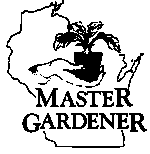
Winnebago County Master Gardener Association
Horticulture Education • Environmental Stewardship • Community Service • Fun!
FAQs
Who is eligible to be a Master Gardener?
Any resident of Wisconsin 18 years or older with an interest in horticulture and willing to help people with their horticultural concerns. Participants are expected to provide volunteer service to their community.
What do I have to do to become a Certified Master Gardener?
To become certified, you must complete the minimum 36 hours of training, sign a volunteer agreement, achieve a 70% or better score on the final exam and complete at least 24 hours of volunteer service within one year of training. At the completion of all the requirements, you may receive an official Master Gardener Volunteer certificate and are eligible to order a name badge.
What are the responsibilities of a Master Gardener?
As a Master Gardener Volunteer you are a representative of the University of Wisconsin - Extension, and as such should act in a professional manner and maintain a professional image. You should be knowledgeable, but also know your limitations (be able to say "I don't know").
How do I get started?
Master Gardener training is offered through the Winnebago County UW-Extension office. See Master Gardener Classes, Seminars and Trips for more information. (You do NOT need to be a Winnebago County resident.)
What type of training is offered?
Basic Training and Advanced Training are the two types of classes that are offered for certification as a Master Gardener. Winnebago County offers Basic Training once each year. Not all counties offer both types of training every year. Advanced Training is only open to Master Gardeners who have completed Basic Training. In both the general and advanced training programs you are expected to attend all the classes and will be asked to sign in at each session.
When are classes held?
The Winnebago County MG Association's Basic Training classes required for certification are normally scheduled for the fall. It consists of 12 weekly evening classes. Please watch this site for changing information. In the meantime, you can enjoy continuing education activities and seminars offered to the public through the WCMGA. Or, you might choose to participate in the certification training in a neighboring county. Contact the County Extension office or visit the web site of the county of your choice.
What topics are covered in Basic Training?
You will receive a minimum of 36 hours of in-depth classroom training on a variety of horticulture topics including soils, botany, entomology, plant pathology, houseplants, landscaping, turf, vegetables, fruits and ornamental plants.
Who teaches the Master Gardener classes?
The classes are taught by University personnel including Extension Specialists from the Departments of Horticulture, Plant Pathology and Entomology, horticulture educators, Extension agents and other qualified professionals.
Where are Basic Training classes held?
Most classes are held at the Coughlin Center, 625 E. County Road Y, Oshkosh. At times classes are held off site to see first hand areas such as nature preserves and specialized landscapes.
Do I have to take exams?
Historically, an open-book final exam is given at the end of each training program. You must pass this exam with a minimum score of 70% to become certified.
What are some volunteer activities I might do to complete my volunteer requirements?
See the list of our current community volunteer opportunities.
Where am I supposed to volunteer?
Master Gardener volunteers provide service to their community. Opportunities to sign up to participate in the Wisconsin Master Gardener Program Office approved Volunteer Opportunities are posted on this website and through our newsletter.
How can I fit volunteering into my schedule since I work during the day?
Some Master Gardener volunteers have a great degree of flexibility as to when they can volunteer, but those with regular job responsibilities can make arrangements to volunteer in the evening or on the weekends.
How will I keep track of my volunteer hours?
Master Gardeners must keep track of their Volunteer and Education Hours on the Wisconsin Master Gardener Online Reporting System (ORS). All Master Gardeners have a UserName and password to access their ORS account.
Master Gardener Online Reporting System (ORS)
If you cannot log in to the ORS, have forgotten username or password, click the appropriate link on the log in page (forgot username/forgot password).
What happens after I've become a Certified Master Gardener?
Recertification is required annually to remain a Master Gardener in good standing. To be recertified you must complete 10 hours of continuing education and provide 24 hours of volunteer service.
What do I have to do to be a member of the Wisconsin Master Gardener Association (WIMGA)?
Any Master Gardener can become a member of the statewide Wisconsin Master Gardener Association (WIMGA) by paying $5 dues to the Winnebago County MG association treasurer by January 31. Benefits of WIMGA membership include six issues per year of the newsletter sent electronically (or mailed, upon request) directly to you, seasonal monthly meetings which often have an education component that you can watch and submit as part of your annual Continuing Education hours.
What kind of recognition will I get for my participation in this program?
Master Gardener Achievement Certificates are available upon initial certification. WCMGA offers its Golden Trowel Award which is presented to a Winnebago County Master Gardener who has given exceptional service to the program. Certificates of achievement for various levels of volunteer time are awarded by the Wisconsin Master Gardener Association program office.